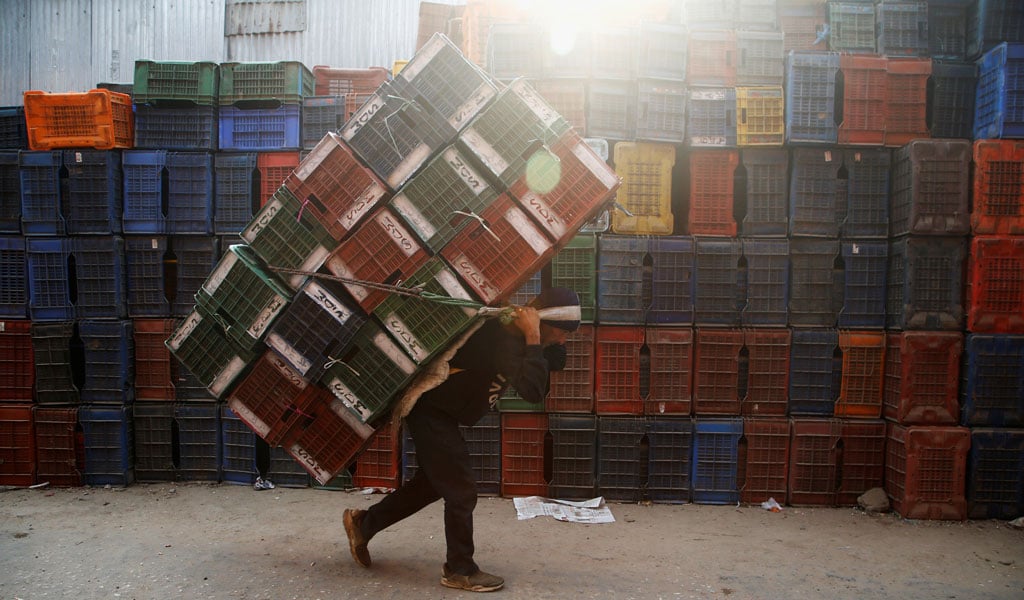August 9, 2017
Version in Français (French)
[caption id="attachment_20946" align="alignnone" width="1024"] A porter in the market in Kathmandu, Nepal: the country increased their tax revenues in recent years with the help of technical assistance (photo: Navesh Chitrakar/Newscom)[/caption]
A porter in the market in Kathmandu, Nepal: the country increased their tax revenues in recent years with the help of technical assistance (photo: Navesh Chitrakar/Newscom)[/caption]
Fragile states face more obstacles to growth than most countries. Their per-capita GDP is less than half of most other low-income countries, and their economies are more volatile. Many are in conflict or going through a natural disaster, or just emerging from these. Our study is based on 39 countries, and since completed, the number of fragile states has increased to 43.
To grow, a country needs tax policies and tax administration, laws and institutions to formulate and execute a budget, and trained staff to implement fiscal policies, among other factors. Our preliminary results show that fragile states that have received technical assistance, also have improved their fiscal performance.
Technical assistance and higher revenues
Eleven out of the eighteen fragile states that were the most intensive recipients of our support in tax policy and tax and customs administration improved their revenue performance from 2004 to 2014. The Democratic Republic of Congo, Guinea, Liberia, Malawi, and Nepal made noticeable improvements.
In public financial management, scores based on a standardized assessment of a country’s public expenditure framework have improved significantly in countries where our technical assistance has been more intensive.
As the figure below shows, budget credibility scores improved in Haiti, Kosovo, Mali and Timor-Leste. Afghanistan, Kosovo, Mali and Timor-Leste improved their capacity to manage the additional cash they brought in.
How they are fragile
While revenues in fragile states have increased on average in the past decade, they are below the levels in other low-income countries that are not ‘fragile’—around 13 percent of GDP compared to around 19 percent of GDP—a significant gap. Fragile states tend to rely on fewer types of taxes, including trade taxes, as the figure below shows.
Public spending in fragile states is mostly on wages and capital spending given the strong need to build infrastructure and expand public services. But this leaves less money for governments to spend on goods and services, and on social services.
Approach to building institutions
The approach to designing and implementing fiscal reforms in these countries is different and depends on whether they have just emerged from conflict or a natural or health disaster.
For countries just emerging from conflict or disaster, the IMF’s technical assistance focuses on ensuring that basic tax revenues are collected, based on easy-to-collect taxes at the border, as well as a few high-yielding excise taxes, and introducing simple organizational structures and basic processes for tax and customs administration. For expenditures, the emphasis is on gaining control over the budget, including preparing and executing the annual budget and consolidating cash resources so the government can meet its immediate payment obligations.
Once countries become more stable, the emphasis shifts to medium-term goals, such as improving the design of the major taxes or introducing a value-added tax, establishing large and medium-size taxpayer offices, and introducing medium-term budgeting and IT systems to support public financial management.
Experience has taught us a few key lessons for countries and development partners
- Because institutions are weak, staff capacity is low, and reforms are often interrupted, revenue and expenditure reforms need to have a medium-term focus—anywhere from five to ten years.
- Countries and development partners must be completely on board regarding the overall reform program, work towards common goals, and coordinate their activities. Policies should be clearly sequenced—overly ambitious reforms risk not working.
- Customs administration should be part of the reform given that these states rely heavily on taxes that are collected at the border.
- Technical assistance should be flexible, and reflect countries’ needs and changing circumstances.
- The impact of revenue conditionality in IMF-supported programs works over time; because fiscal institutions are weak, program conditionality may not yield the desired results during the program period.
The institutions that most countries take for granted are often non-existent or deficient in fragile states, and without them, economic growth and development can grind to a halt. Building strong institutions will help fragile states build more resilient economies.








